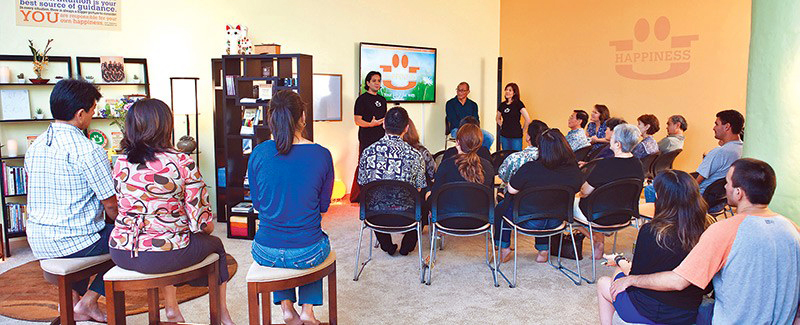A workshop is productive only when participants are ready to explore and co-create knowledge by getting physically, mentally, and emotionally involved in various activities
Kathmandu, April 3, 2017: You are just passively sitting in a group and not contributing anything at all,” I whispered to a participant during a recent workshop we were conducting.
She hesitated a bit and gave me an awkward smile. During the break, she came up to me and said, “Actually, I didn’t know much about this workshop. My friend dragged me here with her. So I was a little lost during the activities.”
Initially, I had assumed that she was just trying to give me an excuse. But clearly, she didn’t know why she was there.
Her confession made me think about why participants act the way they do during workshops. And how, not only the trainer but also the participants should take responsibility for the effectiveness of a workshop session.
As a teacher and teacher-trainer, I believe that a workshop is productive only when participants are ready to explore and co-create knowledge by getting physically, mentally, and emotionally involved in various activities.
The trainer’s role is to deliver the content and facilitate the learning; but in an effective workshop, participants must also take active roles to learn by doing and reflecting on their learning.
As much as the participants want the trainer to be prepared, the trainer also dreams of having participants who are ready to participate and learn.
So, next time you participate in a workshop, keep these ten things in your mind so that you can make your workshop experience worth your precious time:
– Understand your real reasons for joining the workshop and check if they align with the workshop objectives (besides the price, timing, and location). You may have wanted to, for instance, improve your fiction writing skills, but the workshop might be about technical writing.
True, sometimes, you may simply be curious and want to learn new skills. There is no harm in that but it is highly likely that you will not apply the learning from a workshop when there’s a mismatch of goals.
– Understand the modality of the workshop. Ask for the format, duration, and delivery style. Most of the time, workshops turn out to be long lecture sessions that put the participants into coma.
You may have different expectations. And when your expectations don’t match with the workshop, your motivation (and consequently, overall learning) will naturally nosedive.
– If you have signed up for a workshop, try to get in touch with other participants. This is easy these days because most of the workshops are promoted through social media platforms where you can see who else is going. Also, try to get in touch with the facilitator and put forward any queries you may have before the workshop.
– Don’t go into a workshop without any preparation. Yeah, you read it right. You might say, ‘But I’m not the trainer. Why should I be prepared?’ But, even as a participant, you can add value to the workshop. So, read articles related with the theme/title of the workshop. Dig something up. Go with the willingness to contribute.
– And go with an open mind, without judgment. Your positive contribution can really elevate the quality of the workshop. Sometimes, you may have been compelled to join the workshop. May be your boss has convinced you to be there. But even if you are in the workshop without a choice, don’t resist like an insolent kid. Since you are already there, why not make the best out of the situation?
– A workshop is also a great opportunity to meet new people. During activities, try to pair with new faces. If you have a friend with you, ditch him or her. Go sit with someone you don’t know. It might be a cliché but try to ‘get out of your comfort zone’. Even when you don’t get anything out of the workshop, you may be able to at least network with new people.
– Provide proper and concrete feedback to the facilitator after the workshop. Be specific. Don’t write ‘It was a good workshop’ or ‘It was not as expected’. Instead, write ‘The activity after the break was very helpful in understanding the concept’ or ‘I could not understand the relationship between the workshop title and the content’. Your feedback can provide a completely new perspective for the trainer, and can also help the trainer avoid the dreaded ‘curse of knowledge’ in the future.
– Stay in touch. With the facilitator and with other participants. Keep sharing new learnings and new experiences. Don’t treat any workshop as a picnic spot where you had some fun and you met some new people. Take it as a springboard to jump into another level of skill and knowledge.
– Request the trainer for a follow-up session. If that is not possible, request him/her to go through your ‘work’ that you have come up with. New learnings become meaningful when applied immediately and frequently. For instance, if you have attended a workshop on writing, send your writings for review and guidance. Share it with the other participants and ask for feedback.
– Share the ideas and skills with someone else—a friend or a colleague. There’s a adage that says when you teach, you learn twice. This is one of the best ways to retain your learning from the workshop. This also gives you a chance to assess and reflect on your own learning.
So, the next time you decide to join a workshop, walk in prepared to learn, have fun, share, make friends and reflect. Trust me, teachers and trainers also desperately need positive reinforcement from the learners.
By Umes Shrestha
The writer is a teacher and trainer associated with King’s College, Kathmandu and Empowerment Academy. He can be reached at umes.shrestha@gmail.com







